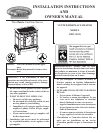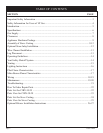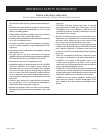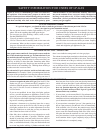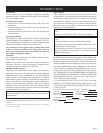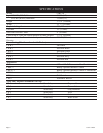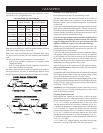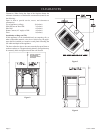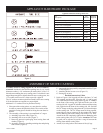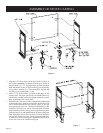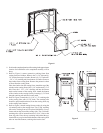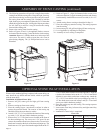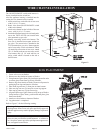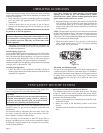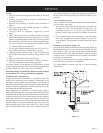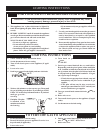
Page 515627-5-0807
Introduction
Always consult your local Building Department regarding
regulations, codes or ordinances which apply to the installation
of a vented fireplace heater.
Instructions to Installer
1. Installer must leave instruction manual with owner after
installation.
2. Installer must have owner fill out and mail warranty card
supplied with heater.
3. Installer should show owner how to start and operate heater
and thermostat.
General Information
This appliance is design certified in accordance with American
National Standard /CSA Standard ANSI Z21.88 and CSA 2.33 by
the Canadian Standards Association, as a Vented Fireplace Heater
and must be installed according to these instructions.
Any alteration of the original design, installed other than
as shown in these instructions or use with a type of gas not
shown on the rating plate is the responsibility of the person
and company making the change.
Important
All correspondence should refer to complete Model Number,
Serial Number and type of gas.
Notice: During initial firing of this unit, its paint will bake out
and smoke will occur. To prevent triggering of smoke alarms,
ventilate the room in which the unit is installed.
Qualified Installing Agency
Installation and replacement of gas piping, gas utilization
equipment or accessories and repair and servicing of equipment
shall be performed only by a qualified agency. The term "qualified
agency" means any individual, firm, corporation or company
which either in person or through a representative is engaged in
and is responsible for (a) the installation or replacement of gas
piping or (b) the connection, installation, repair or servicing of
equipment, who is experienced in such work, familiar with all
precautions required and has complied with all the requirements
of the authority having jurisdiction.
State of Massachusetts: The installation must be made by
a licensed plumber or gas fitter in the Commonwealth of
Massachusetts.
The installation must conform with local codes or, in the absence
of local codes, with the National Fuel Gas Code, ANSI Z223.1
/
NFPA 54.*
*Available from the American National Standards Institute, Inc., 11 West 42nd
St., New York, N.Y. 10036.
High Altitudes
When installing this unit at an elevation above 2000 feet (in the
United States) it may be necessary to decrease the input rating by
changing the existing burner orifice to a smaller size. Generally,
input should be reduced 4 percent for each 1000 feet above sea
level. However, if the heating value of the gas has been reduced,
this general rule may not apply. Check with local gas utility for
proper orifice size identification.
APPLIES TO CANADIAN MODELS ONLY FOR PROPANE
GAS.
Altitude: 0-4,500 feet (0-1370 m) without orifice change.
APPLIES TO CANADIAN MODELS ONLY FOR NATURAL
GAS.
Altitude 0-2,000 feet (0-610m) without orifice change.
Cet appareil est équipé pour des altitudes compris entre 0 et
2000 pieds (0-610m) seulement.
For installations from 610-1370 metres (2,000-4,500 ft.) the
orifice size (DMS) for natural gas is 39. See data plate for
additional information.
For high altitude installations consult the local gas distributor or
the authority having jurisdiction for proper rating methods. If the
installer must convert the unit to adjust for varying altitudes, the
information sticker (illustrated below) must be filled out by the
installer and adhered to the appliance at the time of conversion.
THE CONVERSION SHALL BE CARRIED OUT BY A MAN
-
UFACTURER'S AUTHORIZED REPRESENTATIVE IN AC-
CORDANCE WITH THE REQUIREMENTS OF THE MANU-
FACTURER, PROVINCIAL OR TERRITORIAL AUTHORITIES
HAVING JURISDICTION AND IN ACCORDANCE WITH THE
REQUIREMENTS OF THE CAN/CGA-B141.1 OR CAN/CGA-
B141.2 INSTALLATION CODES.
LA CONVERSION DOIT ÊTRE EFFECTUÉE CONFOR
-
MÉMENT AUX RÉGLEMENTATION PROVINCIAUX EN
CAUSE ET AUX EXIGENCES DES CODES D'INSTALLATION
CAN/CGA-B149.
This appliance has been converted for use at an altitude of
Orifice size Manifold Pressure
Input (Btu/h) Fuel Type
Date of Conversion Converted by
Cet appareil a été converti au
Injecteur Pression à la tubulure d'alimentation
Déoit calorifique
INTRODUCTION



